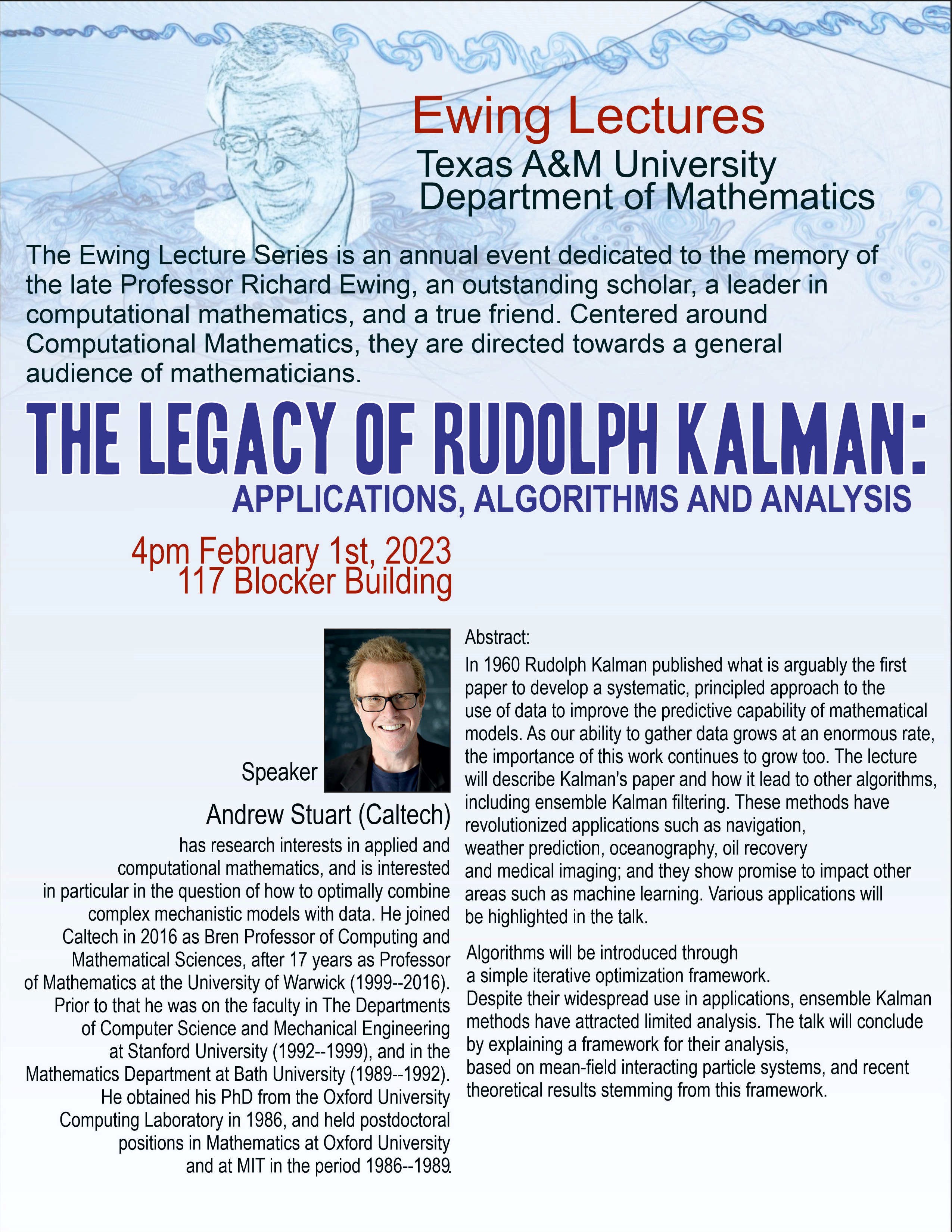
Andrew Stuart, Bren Professor of Computing and Mathematical Sciences at the California Institute of Technology, will visit the Texas A&M University campus on Wednesday, Feb. 1, to present the 2023 R.E. Ewing Lecture in Computational Science, named for former Texas A&M Vice President for Research, Dean of Science, Distinguished Professor of Mathematics and world-renowned scientist Dr. Richard E. Ewing.
Stuart’s lecture, “The Legacy of Rudolph Kalman: Applications, Algorithms and Analysis,” is set for 4 p.m. in Room 302 of the John R. Blocker Building as well as via Zoom. It will focus on Kalman's 1960 paper, believed to be the first to develop a systematic, principled approach to the use of data to improve the predictive capability of mathematical models. Stuart also will detail how this seminal work led to other algorithms, such as ensemble Kalman filtering, as well as methods that have revolutionized applications, including navigation, weather prediction, oceanography, oil recovery, medical imaging and even machine learning.

The R.E. Ewing Lecture Series in Computational Science was established in 2019 through the Texas A&M Foundation using funds from the Richard E. Ewing-ExxonMobil Chair in Computational Science (currently held by Texas A&M mathematicians Yalchin Efendiev and Jean-Luc Guermond) in combination with contributions from several of Ewing’s friends and colleagues. The series is intended to bring eminent speakers to Texas A&M on an annual basis to provide opportunities for Texas A&M students to learn from leading mathematicians in an area of study Ewing helped pioneer.
Ewing, who passed away Dec. 5, 2007, at the age of 61, came to Texas A&M in 1992 and served as Dean of the College of Science for eight years prior to being named Vice President for Research in 2000. He also was the founding director of the Texas A&M Institute for Scientific Computation. His profound discoveries in the areas of mathematics, engineering and computational sciences in tandem with his visionary leadership of the flagship campus’ broader research enterprise played a central role in Texas A&M’s emergence as an internationally recognized university of the first rank in science and engineering.

A fellow of the Royal Society (2020) and Caltech faculty member since 2016, Stuart is interested in how the current era of data acquisition interacts with centuries of human intellectual development of mathematical models that describe the world around us. As an applied mathematician in the Division of Engineering and Applied Science, he generates the mathematical and algorithmic frameworks that allow researchers to integrate mathematical models with data, with the goal of making more accurate predictions in a host of diverse geophysical, environmental and healthcare-related sectors. His work has been recognized with many awards, including most recently the 2022 Vannevar Bush Faculty Fellowship, the U.S. Department of Defense's most prestigious research grant award.
Originally from London, Stuart received his undergraduate degree in mathematics from the University of Bristol in 1983 and a combined master's/doctorate in computing from the University of Oxford in 1986. He held postdoctoral positions at both Oxford and MIT from 1986 to 1989 as well as prior faculty appointments at the University of Bath (1989-1992), Stanford University (1992-1999) and the University of Warwick (1999-2016) prior to relocating to Southern California as Bren Professor at Caltech in the summer of 2016.
Add your support to the Ewing Lecture Series or find additional information about establishing a memorial gift through the Texas A&M Foundation.

